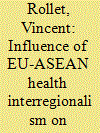| Srl | Item |
| 1 |
ID:
180345


|
|
|
|
|
| Summary/Abstract |
What explains the variation in how states collectively deal with public health challenges across different regions? We tackle this puzzle by comparing the regional health governance efforts pursued within the Central American Integration System (SICA) and the Union of South American Nations (UNASUR). We show that Central America's health governance has been driven by external actors, whereas South America's was driven by states within the region, and remained insulated from external actors’ influence. We argue that the explanation for such variation lies in the interplay of state capacity and regional leadership. In Central America, weak state capacity combined with the absence of a regional leader willing to provide governance resources. This opened up space for external actors to contribute actively to regional health governance, complementing the governance of Central American governments. In South America, Brazil's regional leadership mobilised neighbouring states’ capacities by promoting a South-South cooperation agenda based on intra-regional exchanges among national health bureaucracies, which, however, proved vulnerable to intergovernmental conflicts. Through the comparison of Central and South America, the article bridges the gap between global health governance scholarship and comparative regionalism, providing new insights on the determinants and effects of regional health governance modes in the Global South.
|
|
|
|
|
|
|
|
|
|
|
|
|
|
|
|
| 2 |
ID:
154428


|
|
|
|
|
| Summary/Abstract |
Over the past decade, remarkable and sustainable progresses have been made in the Association of Southeast Asian Nations (ASEAN) region in the domain of communicable disease control. Nevertheless, communicable diseases remain an important public health issue in the region. In December 2009, within the framework of its Regional Programming for Asia (2007–2013), the European Union (EU) launched a Regional Program on Highly Pathogenic and Emerging Diseases (HPED) in Asia. This 4-year interregional cooperation initiative aimed at enable ASEAN to control zoonoses and to improve pandemic preparedness in the region. Assessing this interregional initiative, the main objective of this paper is to shed light on the nature and functions of health interregionalism between Asia and Europe and its influence on regional health governance. It concludes that while in the specific context of the EU-ASEAN HPED program, health interregionalism had varied functions and a substantial influence on regional health governance, this initiative did not use the full potential that interregional health mechanism may provide to influence the development of another region or to promote the EU’s specific actorness in regional and global health.
|
|
|
|
|
|
|
|
|
|
|
|
|
|
|
|